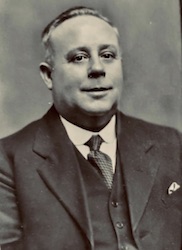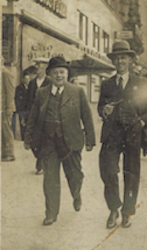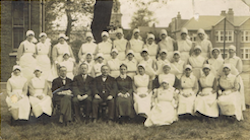Bermondsey ILPer Joe Cragie’s handwritten memoir was discovered by his family, Matthew and Marion Rowley, and transcribed by GRAHAM TAYLOR. We reproduce it here as a supplement to Graham’s profile of Cragie and assessment of his role in supporting Ada and Alfred Salter’s Bermondsey Revolution.
Graham says: “I transcribed it with only a few adjustments to punctuation, leaving the grammar uncorrected to retain the Cockney flavour of Joe’s speech.”
 [I am] William Joseph Craigie. Born 16-11-78 at 9 Seven Step Alley, Paradise St. now named Braddon St., Rotherhithe. One end of the Alley was in Paradise St, the other at Rotherhithe Wall, where the Thames is. About 100 yards long, there was 10 small houses in the Alley which had only 5 steps. Why it was named 7 Step Alley was a mystery. Opposite No.9 was a Court called Fishers Court which had about 10 hovels served by a communal stand pump for water and only one WC for all to use. Next to Fishers Court were 2 small houses & I remember several old Irish women sitting outside smoking clay pipes, Next to these 2 houses, one room up and one down, was Geswell farm where there was cattle, sheep, bullocks, pigs etc waiting to be slaughtered further on in the Alley.
[I am] William Joseph Craigie. Born 16-11-78 at 9 Seven Step Alley, Paradise St. now named Braddon St., Rotherhithe. One end of the Alley was in Paradise St, the other at Rotherhithe Wall, where the Thames is. About 100 yards long, there was 10 small houses in the Alley which had only 5 steps. Why it was named 7 Step Alley was a mystery. Opposite No.9 was a Court called Fishers Court which had about 10 hovels served by a communal stand pump for water and only one WC for all to use. Next to Fishers Court were 2 small houses & I remember several old Irish women sitting outside smoking clay pipes, Next to these 2 houses, one room up and one down, was Geswell farm where there was cattle, sheep, bullocks, pigs etc waiting to be slaughtered further on in the Alley.
No.9 was the second on the left from Paradise St. A small house – 2 rooms downstairs 2 rooms upstairs, plus a garret where my brother and I used to sleep. The 2 rooms upstairs was let to a small family named Seanlow. A small yard which had a WC & fowls house on one side and in the other side my mother had made a little garden plot which grew anything that was green. 2 potatoes grew green and tall, some peas and a large plant grown from a maze which I thought would win a prize. In the front room my mother had some flowers in pots, several geraniums, 2 fuchsias, one musk, one creeping Jenny. I remember the pride she used to take in them. Once she brought out of a drawer a scrap book she showed me. She used to paste cuttings from newspapers etc. in it. I thought these flowers were wonderful. My mother must have been artistic. She never told me anything about her past life. Her father (my grandfather), Jerry Mahoney, I used to visit as he lived with a house keeper near where I lived. I could not understand his speaking, broad Irish it was. He must have been comfortably off judging by the furniture he had.
I learned a lot of things later on in life about my mother’s history. She had a brother living at Wanstead who worked with my father as a sampler on the Corn Exchange. Mark Lane. I never saw her sisters & my mother, I never remember her telling me of them. They would seldom argue. I remember my father throwing his dinner in the fire place in a temper. My father used to bring home flour which he had given to him by his employer and my mother used to make bread with it, I used to go to a baker’s and purchase a pennyworth of yeast. I can see now the large earthenware bowl in the fireplace with the bread rising. It tasted fine.
I remember I used to get errands for her, a paper collar size 16, a pork chop from the butchers & other purchases. I think I was fairly happy despite the surroundings and the quarrels of my parents. I remember my brother Sam in his infancy. Also my sister Mary Ann who before she died a few years ago told me many things of the unhappy life my parents had. One side of No 9 was demolished, Fishers Court and Cresswells’ farm included, and Park Building were built on the site. I remember my father’s brothers and sisters as they lived near in Bermondsey.
When I was about 7 years old we moved from the Alley to a house in Vienna Rd nearby now named Bevington Street. We had 3 rooms upstairs. A Mrs Turney had the downstairs rooms. The house was verminous: bugs, fleas, lice, also rats. The few years I lived there must have been hell. We had not lived there about a year when mother, brother & myself caught typhoid fever. We went to Guys hospital. My mother and brother died & were buried together at Manor Park Cemetery. Life here was hell to me. Never a kind word from anybody that I can remember. This made me rebellious, dissatisfied, artful & cunning. No one to advise me. I never remember my father giving me a penny to spend so no wonder I helped myself from his trousers’ pocket every now and again to buy food in coffee shop.
 When I was about to leave school he took me to a second hand shop in Jamaica Rd and bought me a pair of long trousers made of a cord material. I was pleased and proud of
these. One Sunday morning he took me to Petticoat Lane Rag Market and bought me an overcoat for about 1/- [= one shilling] This I was very thankful for as it hid up my ragged coat and kept me warm. These were hard times for us all. So I was passing through the hard school of adversity. When I was 12 years old I left school. A carman who I used to be helping Saturday and any school holiday, when he took me out on his van, got me a job at a cartage contractor in Yalding Rd. 5/- per week but the carman who I was first with used to give me a part of the beer money he got, averaged about 9d to 1/- per day. This helped me as food was cheap and I never went hungry.
When I was about to leave school he took me to a second hand shop in Jamaica Rd and bought me a pair of long trousers made of a cord material. I was pleased and proud of
these. One Sunday morning he took me to Petticoat Lane Rag Market and bought me an overcoat for about 1/- [= one shilling] This I was very thankful for as it hid up my ragged coat and kept me warm. These were hard times for us all. So I was passing through the hard school of adversity. When I was 12 years old I left school. A carman who I used to be helping Saturday and any school holiday, when he took me out on his van, got me a job at a cartage contractor in Yalding Rd. 5/- per week but the carman who I was first with used to give me a part of the beer money he got, averaged about 9d to 1/- per day. This helped me as food was cheap and I never went hungry.
When I told the Head Master at Farncombe St school I was leaving as I had got a job as a van guard he said it was a tragedy. However I do remember my mother giving brother and myself 1⁄2d when we went to Albion St school which she did often. My brother used to buy 2 aniseed balls – we had one each.
I do not now think life in Seven Steps Alley was too bad – I think I was happy there. I have a retentive memory. I could cross the road in 5 jumps. Boys played whipping tops and peg tops, cherry stones through a piece of wood with holes in it, and gambled with buttons. The girls all played shuttlecock and wooden hoops – the boys had iron hoops. One end of Seven Step Alley was in Paradise St. facing the school and church where my daughter got married many years after, and I made many friends with the parents and teachers in later life. The other end of the alley led to the river side. All our side which included Fishers Court and the farm with the two streets next to the alley have been demolished and Park Buildings now stand on the site. The two streets I refer to were named Queen St and King St. All the houses in the streets were slums and known locally as ‘Do as you like’ streets.
When I was about 14 my father moved to Marine St to live with his sister Alice. I was pleased at the time but pleasure was not for long as I found out I was worse off than before in Vienna Rd. Food was scarce. She used to give… [PAGE MISSING]…
Life in the country in the open air done me good. Food was plentiful but you had to fight for it. I had a job getting in the army as I hardly topped 5 feet 3 inches and weight 8 stone. However I passed and was sent to Stoughton Barracks, Guildford, Royal West Surrey Reg. I was sworn in and given the Queen’s shilling at Wellington Barracks, also had a good dinner, before a sergeant took me and another man to Waterloo St. on train to Guildford. Having the 1/- in my pocket, full up with food, I felt on top of the world. I could tell a funny story of my experiences, being fitted out for uniform, boots & socks and shirts and helmet, and parading on the barrack square for inspection, also the remarks of the officers. I was happy enough. The canteen sold beer 3d pint, tobacco 11⁄2 ounce clay pipe free, 7/- per week pocket money. I was never so well off.
I came away from the Army in July 1898 with a kit bag holding 2 shirts, pair of boots, 2 pairs of socks and over £4 in cash. I rigged myself out when I got to Bermondsey at Mrs Tayman’s in Jamaica Rd: a coat and vest, silk handkerchief and a pair of trousers. The lot cost me just over 1 pound. I could not get my digs back in Salisbury Place so I had to go to a lodging house in Bermondsey called Jack Sweeney’s Kip. You had to put your boots under your pillow and sleep with your eyes open. This went on for about a month.
I used to get a day’s work in the docks or at a wharf 6d per hour so I thought I would get a regular job. This I did for JB & SCRy at Willow Walk St. 19/- per week but could make a little in beer money. I had a look round for lodgings. I saw a write up in the window of No.12 Fort Rd. “Lodging for a respectable man.” I knocked at the door – the landlady agreed to accept me as a lodger. She asked me when I was coming – I said now – I will get my belongings later – this consisted of a shirt and pair of socks tied up in a red hanky. When she saw my bundle she said where’s your box. I explained circumstances & told her I used to pay only 6/- per week at my last lodging. She agreed to the same plus 2/- per weekend food, 8/- in all. This left me ample to buy my food. She was a good woman and her husband a good man. I afterwards married her daughter. After a few years I got tired of living with inlaws and moved to Upper Grange Rd. where my daughter Emma was born.
I was married and 20 years old when I happened to meet a Miss Seanlow who lived at 9 Seven Steps Alley. In conversation I told her my mother and brother was dead and buried. She it was who told me, as did later other women, about my mother. My father was not the father of my brother. Father did not know when he married her. It came as a surprise to him I was told. No doubt the cause of domestic quarrels.
 When I was 21 or 22 I began to seek knowledge. I bought an encyclopaedia and read books and also went to Adult School. I was always in the library in Spa Rd, reading different papers & borrowing books. I joined the railway union about the same time. In 1907 I joined the Labour Party. I was good at elocution and considered a good speaker although often I was ignorant of what I was talking about. In 1912 the Labour Party ran me as a Labour candidate, Ward 3 Bermondsey. There was 3 to be elected. The Tories ran 3, the Liberal Party 3. My colleagues were Mr Ammon, afterwards Lord Ammon, and an engine driver named Stott. All the Labour candidates were defeated. In 1912 I was made secretary of my union, a position I held for 25 years and was given a good testimonial from the men (wife had a handbag and umbrella, I had a wallet with £1 notes in it, also a smokers’ cabinet). After the war in 1919 I was top of the poll for the ward 4 Board of Guardians in April 1919. In November 1919 I was top of the poll for the borough council, a position I held over 25 years. The Labour members of the council made me their leader which I was till I retired 27 years after.
When I was 21 or 22 I began to seek knowledge. I bought an encyclopaedia and read books and also went to Adult School. I was always in the library in Spa Rd, reading different papers & borrowing books. I joined the railway union about the same time. In 1907 I joined the Labour Party. I was good at elocution and considered a good speaker although often I was ignorant of what I was talking about. In 1912 the Labour Party ran me as a Labour candidate, Ward 3 Bermondsey. There was 3 to be elected. The Tories ran 3, the Liberal Party 3. My colleagues were Mr Ammon, afterwards Lord Ammon, and an engine driver named Stott. All the Labour candidates were defeated. In 1912 I was made secretary of my union, a position I held for 25 years and was given a good testimonial from the men (wife had a handbag and umbrella, I had a wallet with £1 notes in it, also a smokers’ cabinet). After the war in 1919 I was top of the poll for the ward 4 Board of Guardians in April 1919. In November 1919 I was top of the poll for the borough council, a position I held over 25 years. The Labour members of the council made me their leader which I was till I retired 27 years after.
As a councillor I made many friends, mostly amongst the Catholics. Miss Brady, who was Mistress of St Joseph Schools Paradise St., Miss Donovan, Miss Manning from Tooley St Schools, Father Mack & many others when I consented to serve on the management committee of St. Teresa’s Convent School for girls. I was a manager for years of the St. Teresa’s Convent for girls at Lewisham.
When I was first a councillor there was only 11 out of 60 members of the council. Whilst I was leader we grew to 100% Labour. In 1926 I was made a Justice of the Peace and I still hold that position. I was a success in whatever position I held and made many friends. I have made many mistakes in my life, I admit, but I hold good will & health and happiness to all. I look for the best in everybody and help them to get over their worst.
—-
‘Joe Cragie’s Memoir’ and Graham Taylor’s profile of him were first published in The Redriffe Chronicle in 2023 on permission of Cragie’s great granddaughter Marion Rowley.


